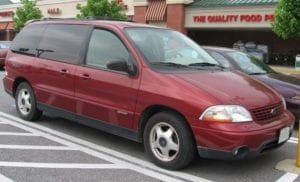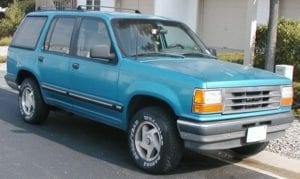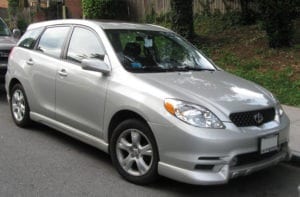Most of us seldom question whether or not the items we buy regularly are risk-free. Unfortunately, many consumer goods are incorrectly designed, manufactured, or marketed. These blunders might result in serious harm or […]
The NHTSA finally released the full list of vehicles affected by the huge Takata exploding airbag recall, and I thought this would be a good time to revisit some of the largest and most-infamous automotive recalls in American history.
Dallas-based company Texas Instruments was responsible for one of the largest automotive recalls, which took place from 1996 to 2009. During that period, Ford had to recall cars and trucks from model year 1992-2004. The entire cumulative recall covered 14.3 million Ford vehicles, making this Ford's largest recall ever.

The defective part was related to the cruise control switch, which was manufactured by Texas Instruments. The switch was prone to leakage and when the switch leaked, it could cause small fires in the vehicle. There were reportedly at least two deaths caused by this defect, and a relatively small amount of injuries. The popular F-series pickup trucks were included in the recall, along with Windstar mini-vans, and various Lincoln and Mercury vehicles. Some vehicles, even though they did not have cruise control, were still included in the recall because they still contained the switch, which was used to route brake fluid rather than control speed.
Vehicles affected: 1995-2003 Ford Windstar, 2000-2003 Ford Excursion diesel, 1993-1997 and 1999-2003 Ford F-Series Super Duty diesel, 1992-2003 Ford Econoline, 1995-2002 Ford Explorer and Mercury Mountaineer, 1995-1997 and 2001-2003 Ford Ranger, and the 1994 Ford F-35 Motorhome.
Prior to 2000, Firestone and Ford had a longstanding business relationship. Henry Ford and Harvey Samuel Firestone's families became linked in marriage when their grandchildren married in 1947. However, around 2000, their relationship became strained as Ford Explorers sporting Firestone tires were causing rollover accidents at an alarming rate.

The Explorer was originally offered for sale in 1990 and around that time, internal documents from Ford showed that engineers recommended changes to the vehicle design because it rolled over in company tests prior to production. These changes were not made, and Ford simply lowered the recommended tire pressure rather than widening the suspension and tread width of the tires as recommended. However, low tire pressure leads to increased heat. When this factor was combined with certain Firestone tires, it was a deadly combination.
Firestone tires were prone to tread separation, which occurs when the tread of a tire peels off. The heat generated by the decreased tire pressure exacerbated the problem. This is usually followed by complete tire disintegration. At high speeds, if tread separation occurred on an SUV like the Explorer which has a high center of gravity, the vehicle could roll over violently. This is exactly what happened to 240 Explorer owners who were killed by tread separation. While later tests showed that the Explorer was no more likely to actually roll over than any other SUV in a similar situation, the combination of the Explorer and Firestone tires was a costly (and deadly) mistake.
From 2009-2011, various Toyota vehicles, even high-end Lexus vehicles, were affected by mechanical sticking of accelerator pedals, which caused unintended acceleration.

Initially, Toyota claimed the problem was related to the driver's side floor mat, which, if placed in correctly, could cause the gas pedal to stick. However, after multiple crashes occurred which were not caused by the floor mat, Toyota issued a second recall which identified an additional problem related to the gas pedal itself.
A total of 7.5 million vehicles were recalled and 37 deaths were alleged to be connected with the defective gas pedal. At the time, it was one of the largest recalls of all time and it severely damaged Toyota's reputation as one of the safest and most reliable automakers.
The list of North American vehicles affected: 2005-2010 Toyota Avalon, 2007-2010 Toyota Camry, 2009-2010 Toyota Corolla, 2010 Toyota Highlander, 2009-2010 Toyota Matrix, 2009-2010 Toyota RAV4, 2008-2010 Toyota Sequoia, 2007-2010 Toyota Tundra, 2004-2009 Toyota Prius, 2005-2010 Toyota Tacoma, 2009-2010 Toyota Venza, 2007-2010 Lexus ES 350, 2006-2010 Lexus IS 250, and the 2009-2010 Pontiac Vibe.
While no formal recall was ever issued by Ford, if it were, it would have been one of the largest recalls of all time. Over 21 million Ford vehicles were affected by a "park to reverse" transmission defect back in the 1970s, where the vehicle appeared to be in park but the transmission slipped into reverse. The defect led to 6,000 accidents, 1,710 injuries, and 98 fatalities. This was a particularly deadly automotive defect.
The National Highway Traffic Safety Administration took a long time to notice the issue and by the time it finally noticed in 1980, much damage had already been done. Ford did not want to issue a recall on the vehicles and although the Department of Transportation threatened to force one, the two entities eventually reached agreement. They agreed that, in lieu of a formal recall, Ford could instead warn customers and issue warning stickers which were to be placed in the cabin of the affected vehicles. ಠ_ಠ
While this post seems to harp on Ford, it is important to note that among major automakers, Ford is second, behind General Motors, in total recalls issued (not considering the recent Takata airbag recalls). Ford's has recalled .93 cars for every one manufactured vehicle. That's bad, but nowhere near as bad as Hyundai. Hyundai's recall rate is a staggering 1.15 cars recalled for every manufactured vehicle. Yes, that's more recalls than the number of vehicles manufactured (which can happen when certain models are recalled multiple times).
If you’ve been injured while driving, we ask that you call us at (214) 651-6100 and tell us about your accident. There’s no cost to discuss your legal options, and the attorneys at Rasansky Law Firm are available 24 hours a day to take your call.
Note: The information that was utilized in this post was gathered from the use of secondary sources. This information used has not been confirmed or independently verified. If you locate any information that is not correct, please contact our firm as soon as possible so that we can make the appropriate corrections. If you find any information that is false, we will remove or correct the post immediately after it is brought to our attention.
Disclaimer: As a valued member of the Dallas community, Rasansky Law Firm’s goal is to improve the safety of all residents in the great state of Texas. These posts should not be viewed as a solicitation for business and the information included herein should not be taken as medical or legal advice. The photos used in this post are not representative of the actual crash scene.
Over 30+ Years Of Personal Injury Experience
Top-Rated and Award-Winning Personal Injury Lawyers
Attorneys Available to Discuss Your Case Now
No Fee Unless You Win
Free Confidential Consultation.
Fill out the form below to receive a free and confidential initial consultation with an experienced personal injury lawyer.